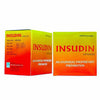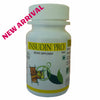What is Cholesterol?
 Cholesterol is found in each and every cell of the human body and has vital natural functions to perform. It is manufactured within the body, and is also taken from the food we consume. It is waxy and fat like in appearance. Cholesterol is oil based, and hence it does not mix with blood, which is water based. It is therefore carried around the body, in the blood by lipoproteins.
Cholesterol is found in each and every cell of the human body and has vital natural functions to perform. It is manufactured within the body, and is also taken from the food we consume. It is waxy and fat like in appearance. Cholesterol is oil based, and hence it does not mix with blood, which is water based. It is therefore carried around the body, in the blood by lipoproteins.
Lipoproteins are a group of soluble proteins that combine with and transport fat or other lipids in the blood plasma. The transportation process of cholesterol is carried out by two types of lipoproteins, they are:
- Low-density lipoprotein (LDL), cholesterol carried by this type is known as bad cholesterol.
- High-density lipoprotein (HDL), cholesterol carried by this type is known as good cholesterol.
When LDL levels are high, they cause a build up of cholesterol in the arteries. The main function of HDL is to carry cholesterol to the liver, for evacuation from the body.
Cholesterol contributes to the structure of cell walls. They produce digestive bile acids in the intestine and also allow the body to produce vitamin D and certain hormones.
High cholesterol or hypercholesterolemia, also known as hyperlipidemia and dyslipidemia is the major cause for coronary heart diseases. Causes heart attacks and also lowers the blood lipid level, risking the cardiovascular system. When LDL levels are high, they cause a build up of cholesterol in the arteries. This build up, contributes to the narrowing of the arteries, called arteriosclerosis.

 There are two types of factors that lead to high cholesterol levels; they are modifiable and non-modifiable risk factors. Modifiable risk factors include diet, exercise and weight, while non-modifiable risk factors include family history, age and gender .
There are two types of factors that lead to high cholesterol levels; they are modifiable and non-modifiable risk factors. Modifiable risk factors include diet, exercise and weight, while non-modifiable risk factors include family history, age and gender .
Signs and symptoms
There are no particular signs or symptoms for cholesterol. Only through regular blood test, high cholesterol can be diagnosed. If left unnoticed, high cholesterol leads to heart attacks and strokes
Effects
Abnormal cholesterol levels are also caused due to diabetes, liver or kidney disorders, polycystic ovary syndrome, and under-active thyroid gland. In females, pregnancy and other conditions that increase levels of hormones, leads to high cholesterol. Also the intake of drugs that increase the levels of LDL and decrease the level of HDL like progestins, anabolic steroids and corticosteroids cause high cholesterol.
Treatment and prevention
 To deal with high cholesterol levels, four major yet small lifestyle changes is advised. They are as follows:
To deal with high cholesterol levels, four major yet small lifestyle changes is advised. They are as follows:
- Proper exercise
- Maintaining a healthy weight
- Having a heart healthy diet, such as less usage of oil, toppings and sauces, avoiding food products high in saturated fat, eating more vegetables, fruits and fiber-rich whole grains.
- Avoiding smoking
The Ayurveda approach
Ayurveda has a different approach to cholesterol than western medicine. In Ayurveda, cholesterol plays an important role in supporting and lubricating the body’s numerous circulatory channels, known as shrotas, the circulatory channels of the body. Cholesterol lubricates and supports the shrotas.
Cholesterol is not that harmful, however it shows a harmful effect when “ama” is present in the body. Ama is the metabolic waste that accumulates like toxins in the fat tissue. Ama is caused due
to improper digestion. They can block the channels of the body, especially the arteries. When ama is present for a long time period, without removal from the body, and “amavisha” is created. When ama gets excessive and accumulated in the body, they get mixed up with the body tissue and waste products of the body. Once mixed with the fat tissue, amavisha damages the shrotas. This in turn leads to problems such as high cholesterol, heart disease, stroke and high blood pressure.

 Ayurvedic treatment for Cholesterol
Ayurvedic treatment for Cholesterol
For treating high cholesterol, Ayurveda not only focuses on cholesterol lowering foods but also on dietary recommendations which balances the overall fat metabolism of the body. In Ayurvedic approach the primary aim is in balancing the Kapha Dosha, one of the three bodily principles involved in fat metabolism. Unbalanced Kapha is the root cause of high cholesterol. Following a Kapha-balancing diet with bitter, astringent and pungent tasting foods will balance the Kapha dosha and also enhances the fat metabolism. Astringent foods includes pulses or dried beans, also includes vegetables like broccoli, cabbage, and cauliflower and fruits like apple and pears.
All sorts of leafy greens, including spinach, chard, kale and mustard greens contributes to the bitter foods. When cooked and spiced, these greens help cleanse the bowels, which prevents the accumulation of bad cholesterol.
A healthy diet to balance Kapha should ideally include many healthy grains, such as oats. Also avoid sweet, sour and salty foods like sugar and also sweet grains like wheat, rice, pasta and breads, avoid sweet milk products, sour foods like lemon, tomato, cheese, yogurt and also ketchups and pickles.
Consuming warm food also helps in balancing the kaphadosha, also avoid saturated fats, and cook with less amount of oil and ghee.
The buildup of cholesterol can be reduced by several Ayurvedic treatments. Cholesterol reduction means safety from the various cardiovascular diseases, which are the leading causes of deaths in the world today.
 Ayurvedic treatment approach also focus on herbs that reduce accumulation of cholesterol and its buildup. One such herb in Ayurveda is Arjuna. It is prescribed in several forms like Arjunarishta and ArjunaGhritam. Other popular medicines are Hridayarnava Rasa and PrabhakaraVati. If the cholesterol amount is very profuse, then Mrigamadasava is prescribed.
Ayurvedic treatment approach also focus on herbs that reduce accumulation of cholesterol and its buildup. One such herb in Ayurveda is Arjuna. It is prescribed in several forms like Arjunarishta and ArjunaGhritam. Other popular medicines are Hridayarnava Rasa and PrabhakaraVati. If the cholesterol amount is very profuse, then Mrigamadasava is prescribed.
Yoga is also very beneficial in proper circulation and elimination of the cholesterol buildup in the body. Some of the useful asanas are
- Ardhamatsyendrasana
- Shalabhasana
- Padmasana
- Vajrasana

Home remedies for High Cholesterol
- Drink plenty of water, as water enhances the excretory functions of the kidneys thereby reducing the level of cholesterol in the body.
- Add some coriander seeds in one glass of water boil the water and have it when it’s lukewarm.
- Apply some mudpack on the abdomen as it activates the kidneys and enhances the function of liver and also helps to reduce the levels of cholesterol in the body.
- Boil some cinnamon sticks in 5-6 cups of water, add a tsp of honey and consume it when it’s lukewarm.
- Eat more wheat yeast and germs, as they re very rich in Vitamin B6, inositol and chlorine which contributes to cholesterol reduction.
- Consuming onion juice is another home remedy to cholesterol, as onion helps in reducing the cholesterol level in the body. Also it cleanses the blood and regulates the heart action, cures insomnia and enhances the digestive system.







